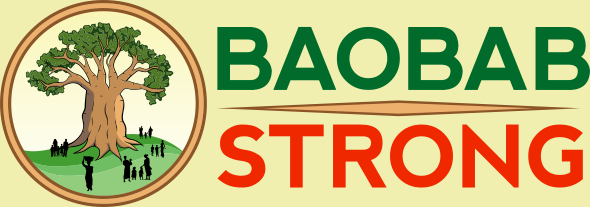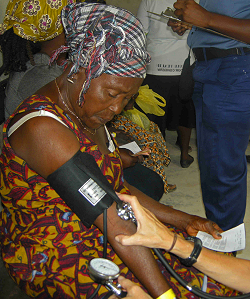
Importance
There is a lack of access to medical facilities in impoverished rural areas. An unhealthy community cannot prosper. As we improve poorer communities, we will strive to assure basic medical care is within the reach of all.
Goals & Current Projects
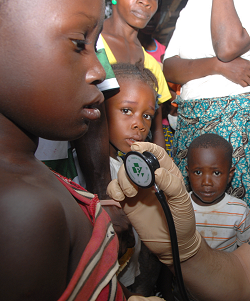
Visiting nurse: We are working to establish links between trained medical staff and people living in remote areas. Scheduled nurse visits to remote villages reduce the number of emergency cases and deaths by identifying and caring for patients with the most need. Visiting nurses also provide preventative care through vaccinations and health screening.
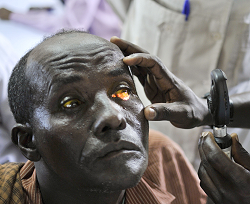
Medical Clinic: Our goal is to establish medical clinics in isolated regions for people with no access to health care. These services may include emergency first aid, vaccinations, diagnosis and treatment of disease, pre-and post-natal care, hearing and eye exams.
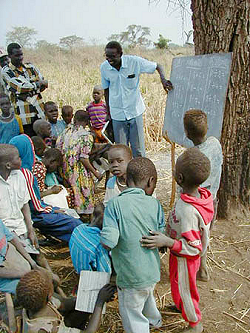
Health and Nutrition Talks: We are promoting community education on basic medical concepts, such as proper nutrition, maintaining healthy blood pressure, importance of vaccinations, and controlling diabetes.
Medical Supplies: BAOBAB STRONG is working to obtain donated medical supplies for rural outreach.
Emergency Transportation: Lives can be saved by having an emergency medical transport vehicle for very remote communities with no access to motorized transportation.
Statements
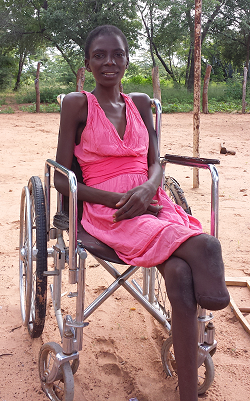
Imagine one day waking up with only one leg after you have been accustomed to walking around with two legs all your life. That was my fate in 2015.
In 2012, I got very sick and was told I had diabetes. In my mind, diabetes, locally known as “sugar disease”, affected only old people. I was only 22 years old!
Nonhlanhla lives in an isolated rural region where access to medical care is extremely limited, and often too costly for the impoverished local people. When she got sick, she was fortunate to find a way to a rural hospital. But her whole life would be turned upside down.
I was discharged with a supply of insulin and syringes. Talk about being overwhelmed and scared! I barely understood what diabetes was and all of a sudden I was going to give myself injections. To make matters worse, my eyesight is poor, so I could barely tell the markings on the syringe. My insulin doses were probably never accurate.
Many times I woke up in the night drenched in sweat with a feeling of doom from what I now know as hypoglycemia. A few times I fell into a state of coma because my sugar levels had dropped too low following insulin injection. That was very traumatic to my family since they had to frantically look for transportation to hospital (very difficult and expensive). The truth is that I had very little knowledge about diabetes and think that trusting me with insulin was one of the worst tragedies that happened to me and my parents.
I underestimated the seriousness of infection (caused by diabetes) that developed on my left foot. By the time I sought medical attention, the infection had spread to the lower part of my leg. The only treatment that could save my life was an amputation. I was fortunate enough to successfully undergo a below knee amputation.
I have since started on diabetic tablets and feel much healthier and in control of my health now. Though, getting around is a challenge! I use an old borrowed wheelchair whose tires are so worn out you can see much of the rims.
I tell my story with the hope that there is someone out there that can help me to secure a better wheelchair to get around (in sandy soil). Better still, I hope someday to secure an artificial leg (prosthesis).
Many people in our area suffer from diabetes and I think it would help if hospitals and non- governmental organizations can make diabetic teaching a priority.
Nonhlanhla
As we learn from Nonhlanhla’s story, much of her health problems could have been prevented with better education about diabetes and it’s management, and increased access to health care. Her life will now be negatively impacted, as she struggles to cope. She is in dire need of help, so she can be a productive member of her community, and live a long happy life.
BAOBAB STRONG is now helping Nonhlanhla. There are countless others throughout the developing world needing similar help. Our health projects are committed to this effort, and with your help many lives can be improved.
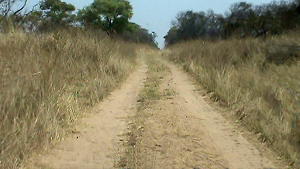
The importance of access to medical care in rural communities was clearly demonstrated when a future BAOBAB STRONG founder was visiting an isolated area in Africa.
One morning, a gentleman approached my family seeking help for his wife who had given birth overnight and was severely bleeding. The man had no car and the nearest medical facility was several hours away to travel via donkey and cart. After seeing the woman and realizing we were unable to help her on our own, we arranged to drive the woman to hospital. Even with a car, the poor condition of the roads and distance made the trip unbearably long. Unfortunately, the woman died before reaching the hospital.
Though, to her honor, this tragic experience motivated the local community to work towards establishing a local medical clinic. And it was a major reason I helped found BAOBAB STRONG, so we could help in this effort.
Sibusisiwe Gumbo
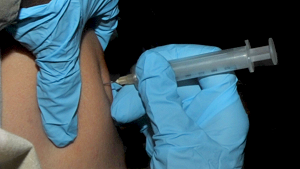
After I completed training as a nurse and midwife in Zimbabwe, I worked for about 5 years providing maternal and child health services in rural and remote areas of Binga and Tsholotsho Districts. Many of the conditions that I encountered such as malnutrition, diarrheal diseases and malaria are preventable but unfortunately the poor communities that I served lacked and still lack resources and knowledge to prevent them.
My firsthand experience of life in rural Zimbabwe has kept me motivated to engage in activities that improve the health of people facing challenges of severe poverty.
As a founding member of BAOBAB STRONG, I am happy to work with a dedicated team of volunteers whose goal includes support for programs aimed at increasing access to health care in marginalized communities. Through BAOBAB STRONG, I am currently working with the Jibajiba community on planning health programs that will improve lives as individuals, families and the community at large.
Catherine Gumbo
